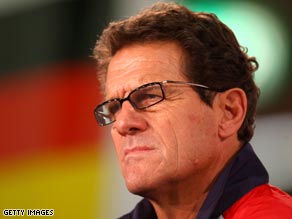For CNN
LONDON, England (CNN) -- The falling value of the pound against the euro might be good for British exporters, but for the country's football clubs it's a kick in the teeth.

England boss Fabio Capello has taken a hit on his salary as the pound falls against the euro.
January's transfer window is eagerly awaited by fans and managers alike, seeking to add that bit of extra quality the last few months have shown their team to be missing.
In the past, buying from mainland Europe has proved cheaper than buying from within the British Isles, which goes some way to explaining why there are so many overseas players in the Premier League and the Scottish Premier League.
Now, though, clubs must deal with a pound worth somewhere a little over a euro -- in 2001 £1 ($1.4) was worth just shy of €1.8 ($1.5).
To put that in context, Manchester United paid Lazio £28.1m or €50.6m for Juan Sebastian Veron in the summer of 2001, roughly equivalent to $39m.
If the European champions bought the Argentine midfielder today it would cost them a world-record-threatening £45m ($63m).
Tottenham's purchases of Croatia midfielder Luka Modric and Roman Pavlyuchenko, the Russia striker, were both completed and announced to the London Stock Exchange in euros. Have your say on this issue
The transfer fees are being paid in installments, meaning the total amount the club pays for the duo fluctuates.
Right now the €21m ($29.3m) agreed with Dinamo Zagreb for Modric and the €17m ($23.8m) agreed with Spartak Moscow for Pavlyuchenko are getting more expensive by the day.
So could the economic downturn spell the end of the Premier League's reign as unofficial top dog?
"Obviously the falling value of the pounds is going to give English clubs food for thought in the transfer window, but also that also applies to the selling club in Europe too," said Dan Jones, partner in the sports business group of leading auditors Deloitte.
"It might just make English clubs look closer to home for their purchases. But as the history of the last few transfer windows suggests, I don't think they're about to be overtaken.
"The gap between clubs outside the elite in England and their European counterparts in terms of revenue is huge, so it's not going to be game-changing."
Manchester City's buyout in August by the cash-rich Abu Dhabi United Group Investment and Development Limited gives the club a pronounced advantage when it comes to buying power, irrespective of the strength of the euro.
And Jones believes the transfer market in January hinges on what they decide to do.
He added: "The catalyst in the market will be Manchester City -- if they spend big and early in the window, then the knock-on effects would mean the market is reinvigorated.
"If they don't, then it will probably be quiet. I'm expecting January to be slow all round."
It's not just the clubs feeling the pinch.
The UK's Sun newspaper reported in November that England head coach Fabio Capello has lost the equivalent of £1m ($1.5m) on his salary due to the fall in the value of sterling.
His four-year contract, worth a reputed £6m ($9m), was signed last year and is paid in pounds. But because he does his banking in Italy he has lost around €1.2m ($1.7m) on the deal.
No Premier League club would confirm whether any of their players are paid in euros but there may be some. And if there are, they are laughing.
A salary paid in euros buys significantly more in the UK than it has done at any point since the currency's introduction in 1999 and would see the club shelling out higher wages for the same player in comparative terms.
So when the January transfer window opens, don't be surprised if your club is not as active as you were hoping they might be. That prolific Spanish striker the scouts have had their eye on might now be priced out of the market.
And the flip side to a weak pound makes shopping in England more attractive for European clubs. Expect more gossip linking Cristiano Ronaldo to Real Madrid, although whether the Spanish giants put their money where their mouth is remains to be seen.
Money's tight, even in the richest league in the world.Original here
No comments:
Post a Comment